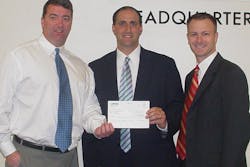Steve Regan
After years working on Capitol Hill, a casual chat with a neighbor led to a marketing job for the Concerned Autobody Repairers for Equality, and that landed Steve Regan in an unlikely career in collision repair. A media whiz, Regan helps shops and organizations handle advertising and legislative strategies. He served as executive director for the Massachusetts Auto Body Association (MABA) from 1999 to 2001, and he’s recently been appointed to the Society of Collision Repair Specialists (SCRS) board of directors. With nearly 10 years in the biz, he feels like one of the family, and that sense of loyalty drives him to advocate for collision repairers.
You’re involved with state legislation supported by MABA. What are the current threats to collision repair in Massachusetts and to the industry as a whole?
While we have no DRPs in the state, we have extensive illegal steering. So, insurers are still directing the insured to a favored repairer.
The biggest challenge we face in Massachusetts is lack of enforcement of current regulations and statutes that protect consumers and repairers from insurer abuse. If the industry had the protection it deserves for its regulators then much of the legislative efforts under way would not be necessary.
For instance, we have no law that allows an insurer to arbitrarily set a labor rate and impose it on every shop they deal with, but it happens anyway. Legislation is necessary because insurers unilaterally decide what they will pay for labor—and they refuse to negotiate with the collision repairer.
What’s the most important issue repairers face today?
Restoring more say to the repairer in how they run their business, repair the vehicle and charge for their services. Whether this happens by legislation, collision repairer revolt or some other mechanism, it needs to happen or the collision repair businesses—and those that sell products and services to them—face some very hard times.
It seems there’s always a new issue to face; what’s next?
New technologies and the exotic metals used in manufacturing today’s cars. In most industries, you’d see increased training and education of technicians, managers and owners. The cost of that would be passed on to the consumer. But collision repairers have worked for years under suppressed labor rates that have cut available capital to pay for such training. In education, every school district in the country is working on budget constraints, so they can’t afford the equipment and resources necessary to train students how to repair these newer cars, either.
You were recently appointed to the SCRS board of directors. What work awaits you there?
I’m actually quite pleased with the stance SCRS recently has taken on industry issues such as steering, insurer abuse and control of repairers. I like what I see, and I want it to continue.
What’s the benefit of SCRS membership?
Access to information and people who can help your business. I once saw a great billboard for a union that showed a monkey on one side with the word “you” underneath, and a gorilla on the other side labeled “you with your union.” If there was ever an industry where individual businesses need the support and resources that an association can provide, it’s collision repair.
